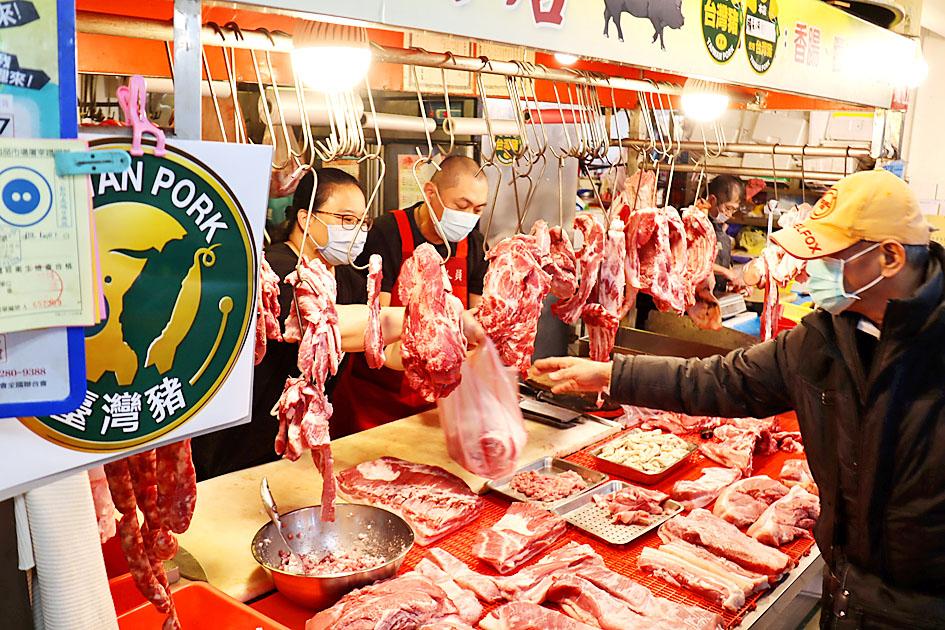Former president Ma Ying-jeou (馬英九) did not promise to import US pork containing ractopamine residue and President Tsai Ing-wen (蔡英文), as the head of state, should speak the truth, Ma’s office said in a statement yesterday.
The office released the statement after Tsai, in her New Year’s Day address on Friday, touched on disputes over her administration’s decision to further open the domestic market to US beef from cattle aged 30 months or older and pork containing traces of the leanness-enhancing additive.
“I fully understand why previous administrations could not follow through with their promises to do that,” Tsai said. “Taiwan depends on trade to survive. This issue was left pending by three successive administrations, so there was no way to avoid it.”

Photo: Weng Yu-huang, Taipei Times
The office said that the Ma administration had agreed to import US beef from animals under 30 months, but had insisted that US beef and pork remain separate issues.
By contrast, the Tsai administration is allowing US beef from cows of all ages and has allowed the importation of US pork with residual ractopamine, without excluding entrails, which generally have higher residue levels, it said.
More than 80 percent of 161 nations have banned meats with residual ractopamine, and that exports of US pork with residual ractopamine face difficulty is a problem for the US government, not for Taiwan, Ma’s statement said.
The Tsai administration has surrendered without a fight on an issue that past presidents have proved could be withstood, it said, adding that the actions are not a solution, but instead create more problems.
“We ask that President Tsai take responsibility for her administration’s own actions, instead of blaming previous administrations,” the statement said.
The Tsai administration owes the public an apology for trying to dodge blame for hastily enacting national policies, it said, adding that her administration should make it clear to the US government that Taiwan welcomes imports of US pork, just not pork with residual ractopamine.
Only then would trade be conducted under the principle of a free and open market, without asking people in Taiwan to sacrifice their health, Ma’s office said.
Separately, Executive Yuan Secretary-General Li Meng-yen (李孟諺) said that there should be a unified national food safety policy, otherwise the food industry would find it difficult to abide by the rules.
Local governments should take their lead from the central government, Li said. If local governments impose fines for “violating local ordinances,” companies should be able to seek compensation from the central government.
The remarks come as several local governments — primarily those held by the Chinese Nationalist Party (KMT) — have said that they oppose the central government’s announcement on Thursday last week that local government ordinances banning meat products containing traces of ractopamine would be nullified.
The KMT has pledged to help local governments seek a constitutional interpretation on the legality of the government’s move to invalidate local ractopamine bans.
Additional reporting by CNA

Taiwan is stepping up plans to create self-sufficient supply chains for combat drones and increase foreign orders from the US to counter China’s numerical superiority, a defense official said on Saturday. Commenting on condition of anonymity, the official said the nation’s armed forces are in agreement with US Admiral Samuel Paparo’s assessment that Taiwan’s military must be prepared to turn the nation’s waters into a “hellscape” for the Chinese People’s Liberation Army (PLA). Paparo, the commander of the US Indo-Pacific Command, reiterated the concept during a Congressional hearing in Washington on Wednesday. He first coined the term in a security conference last

Prosecutors today declined to say who was questioned regarding alleged forgery on petitions to recall Democratic Progressive Party (DPP) legislators, after Chinese-language media earlier reported that members of the Chinese Nationalist Party (KMT) Youth League were brought in for questioning. The Ministry of Justice Investigation Bureau confirmed that two people had been questioned, but did not disclose any further information about the ongoing investigation. KMT Youth League members Lee Hsiao-liang (李孝亮) and Liu Szu-yin (劉思吟) — who are leading the effort to recall DPP caucus chief executive Rosalia Wu (吳思瑤) and Legislator Wu Pei-yi (吳沛憶) — both posted on Facebook saying: “I

The Ministry of Economic Affairs has fined Taobao NT$1.2 million (US$36,912) for advertisements that exceed its approved business scope, requiring the Chinese e-commerce platform to make corrections in the first half of this year or its license may be revoked. Lawmakers have called for stricter enforcement of Chinese e-commerce platforms and measures to prevent China from laundering its goods through Taiwan in response to US President Donald Trump’s heavy tariffs on China. The Legislative Yuan’s Finance Committee met today to discuss policies to prevent China from dumping goods in Taiwan, inviting government agencies to report. Democratic Progressive Party Legislator Kuo Kuo-wen (郭國文) said

Sung Chien-liang (宋建樑), who led efforts to recall Democratic Progressive Party (DPP) Legislator Lee Kun-cheng (李坤城), was released on bail of NT$80,000 today amid outcry over his decision to wear a Nazi armband to questioning the night before. Sung arrived at the New Taipei District Prosecutors’ Office for questioning in a recall petition forgery case last night wearing a red armband bearing a swastika, carrying a copy of Adolf Hitler’s Mein Kampf and giving a Nazi salute. Sung left the building at 1:15am without the armband and covering the book with his coat. Lee said today that this is a serious